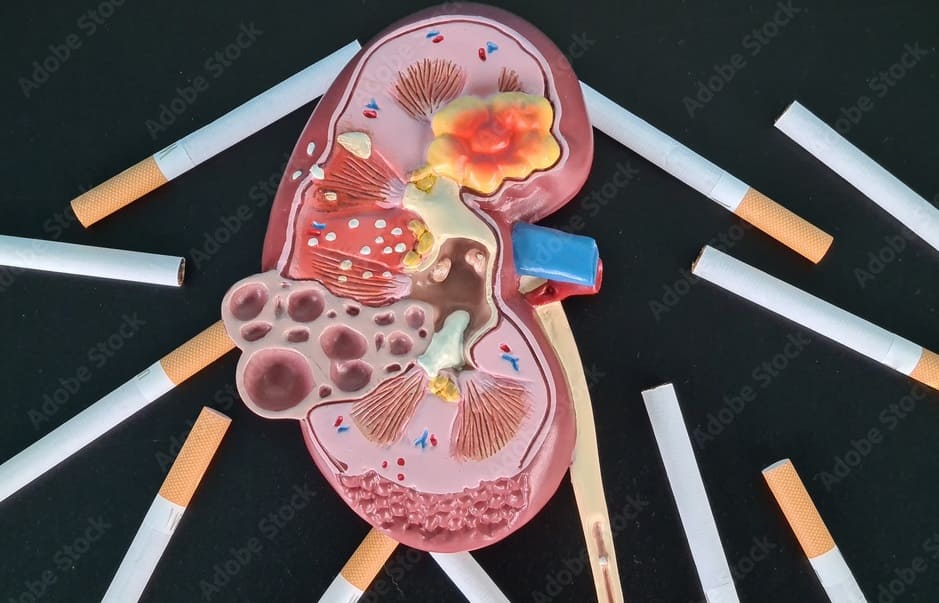When you think of smoking, the first health concern that likely comes to mind is lung damage. And for good reason—smoking is a leading cause of lung cancer, chronic obstructive pulmonary disease (COPD), and other respiratory issues. However, the dangers of smoking extend far beyond the lungs. One organ often overlooked in this conversation is the kidney. Yes, smoking can harm your kidneys, too, and the effects can be just as severe. Let’s take a closer look at how smoking impacts both your lungs and kidneys, and why quitting is one of the best decisions you can make for your overall health.
The Toll on Your Lungs
Smoking wreaks havoc on your respiratory system in multiple ways:
- Lung Cancer: The carcinogens in tobacco smoke are directly linked to the development of lung cancer. In fact, about 85% of lung cancer cases are attributed to smoking.
- Chronic Obstructive Pulmonary Disease (COPD): Smoking damages the airways and the tiny air sacs in your lungs, leading to conditions like emphysema and chronic bronchitis.
- Reduced Lung Capacity: Over time, smoking decreases lung function, making it harder to breathe and perform physical activities.
- Increased Risk of Infections: Smokers are more susceptible to respiratory infections such as pneumonia and influenza.
While the harm to your lungs is well-documented, the effects on other organs—including the kidneys—are often overlooked.
How Does Smoking Affects the Kidneys?
The kidneys play a vital role in filtering waste products and toxins from your blood, regulating blood pressure, and balancing electrolytes. Smoking interferes with these essential functions in several ways:
1) Reduced Blood Flow to the Kidneys: Smoking constricts blood vessels, reducing blood flow to the kidneys. Over time, this can impair kidney function and increase the risk of kidney disease.
2) Increased Risk of Chronic Kidney Disease (CKD): Studies show that smokers are at a higher risk of developing CKD, a condition in which the kidneys gradually lose their ability to function properly.
3) Exacerbation of Existing Kidney Conditions: If you already have kidney disease or other risk factors like diabetes or high blood pressure, smoking can accelerate the progression of kidney damage.
4) Higher Risk of Kidney Cancer: Smoking has been identified as a risk factor for renal cell carcinoma, the most common type of kidney cancer. The harmful chemicals in tobacco can damage kidney cells and contribute to tumor development.
5) Increased Protein Leakage: Smoking can cause the kidneys to leak protein into the urine, a sign of kidney damage known as proteinuria.
The Double Whammy: Smoking and High Blood Pressure
One of the most significant ways smoking harms your kidneys is through its impact on blood pressure. Smoking raises your blood pressure, a leading cause of both kidney disease and cardiovascular issues. High blood pressure puts extra strain on your kidneys, making it harder for them to function effectively. Combined with the direct effects of smoking on kidney tissue, this creates a dangerous cycle of damage.
Why Quitting Smoking Matters?
The good news? Quitting smoking can significantly reduce your risk of lung and kidney damage. Here’s how your body starts to heal after you stop smoking:
- Within Days: Your blood pressure begins to normalize, reducing strain on your kidneys.
- Within Months: Lung function improves, and your body’s ability to repair damaged tissues begins.
- Within Years: Your risk of kidney and lung cancers decreases significantly, and the progression of chronic kidney disease slows.
Tips for Quitting Smoking
Quitting smoking is challenging, but the benefits far outweigh the difficulties. Here are some tips to help you get started:
- Seek Support: Join a smoking cessation program or talk to a healthcare provider about medications and therapies that can help.
- Identify Triggers: Understanding what prompts you to smoke—stress, social situations, or certain routines—can help you avoid those triggers.
- Stay Active: Exercise can reduce cravings and improve lung and kidney health.
- Celebrate Milestones: Reward yourself for reaching smoke-free milestones, whether it’s a day, a week, or a year.
Final Thoughts
Smoking is a major risk factor for a range of health issues, including lung and kidney damage. While the focus is often on the lungs, it’s essential to recognize the harm smoking can do to other vital organs like the kidneys. The sooner you quit, the sooner your body can begin to heal. Remember, it’s never too late to make a positive change for your health.
Also Read:
